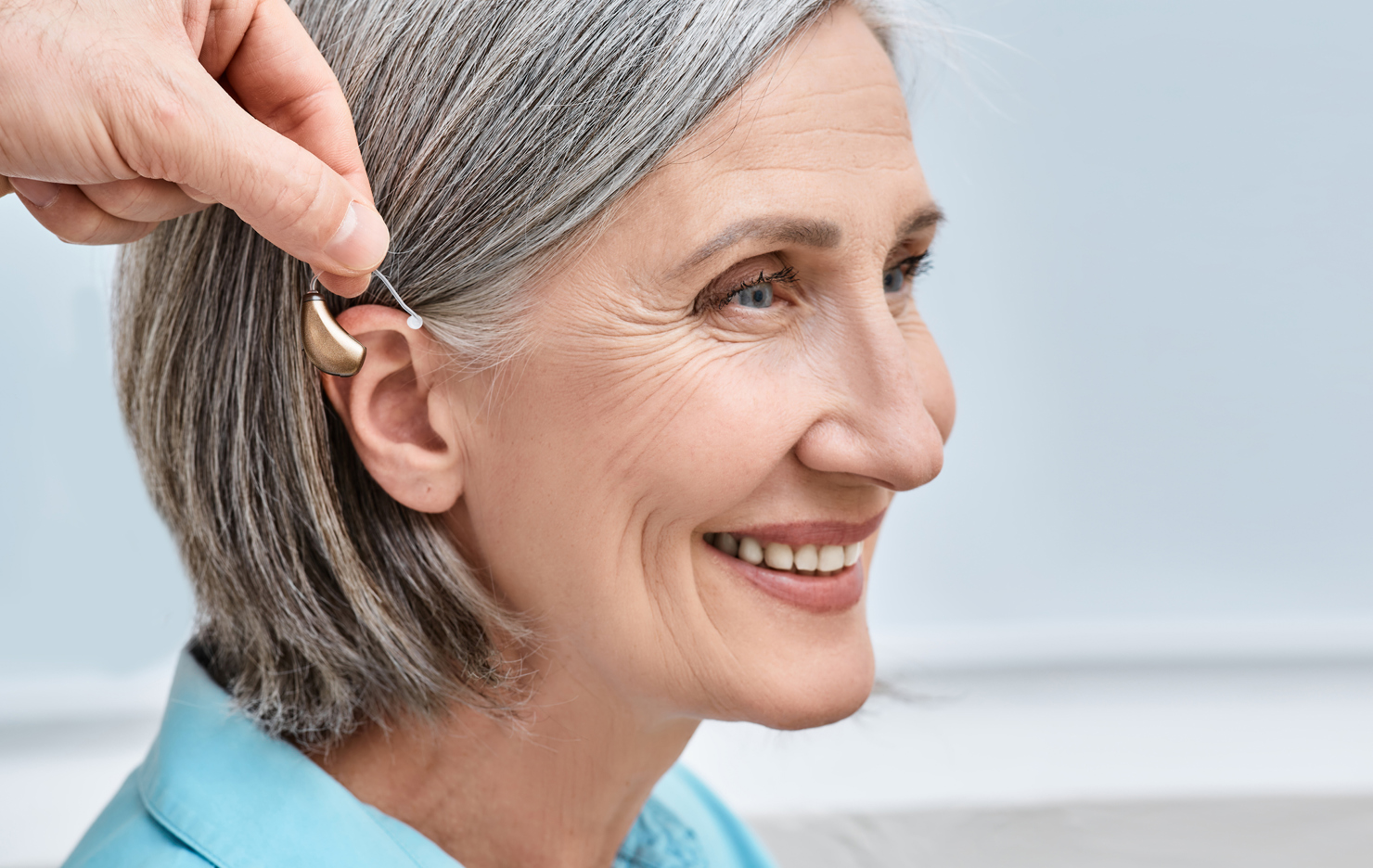
Hearing care professionals have a challenging task: getting people to buy products that they typically don’t want. People often resist getting hearing aids because of the perceived stigma around the devices (“they’ll make me look old”), concern about the cost, or because they think their hearing loss “isn’t bad enough” to need hearing aids. So, how can audiologists overcome these concerns and convince people with hearing loss to get hearing aids?
Many audiologists have found it helpful to spotlight the significant benefits of hearing aids – which goes way beyond “just” helping people hear better. It’s important to educate people that untreated hearing loss can harm their physical, mental, and emotional health. For instance, untreated hearing loss can lead to a variety of mental health conditions, including higher rates of depression, anxiety, dementia, and cognitive decline. Hearing loss can also damage relationships – from marriages to friendships – due to poor communication and ongoing frustrations.
Benefits Go Way Beyond “Just” Improving Hearing
Audiologists and other hearing care professionals need to demonstrate hearing aid benefits to their patients – especially to those who may resist getting hearing aids. People know that hearing aids will improve their hearing – but they likely don’t know that it can also improve their heart health, mental well-being, social lives, and so much more.

Enhanced Quality of Life for People with Hearing Loss
A recent survey showed that people with severe untreated hearing loss were more likely to be in poor health, and less likely to leave home or exercise regularly. Conversely, people who wore hearing aids to improve their hearing reported better health, went out more often, and exercised more frequently. Various studies have shown the vast benefits of hearing aids, which improve all aspects of people’s health, social life, and quality of life.
Improved Mental Health and Emotional Wellbeing
Numerous studies demonstrate that people with untreated hearing loss are more likely to experience depression, anxiety, loneliness, and isolation. In contrast, one study discovered that after people got their first hearing aids, they cut the risk of developing dementia by 18% and anxiety or depression by 11%. A survey by the National Council on Aging confirmed that people with untreated hearing loss are more likely to have depression and anxiety than those who use hearing aids.
Reduced Risk of Cognitive Decline
Dementia is more common among people with untreated hearing loss, according to research. In fact, people with untreated hearing loss experience dementia an average of two years earlier than people without hearing loss.
Another study showed that hearing aids and regular audiology visits decreased the rate of cognitive decline typically seen in older adults with untreated hearing loss.
Guide Download
Help Your Patients Get the Best Experience from Their Hearing Aids
Despite the benefits, many patients struggle with discomfort, sound quality, and other common complaints, leading to frustration and even abandonment of their devices.
Our guide provides actionable solutions to help you improve patient satisfaction, reduce returns, and ensure that more people get the full benefit of their hearing aids.
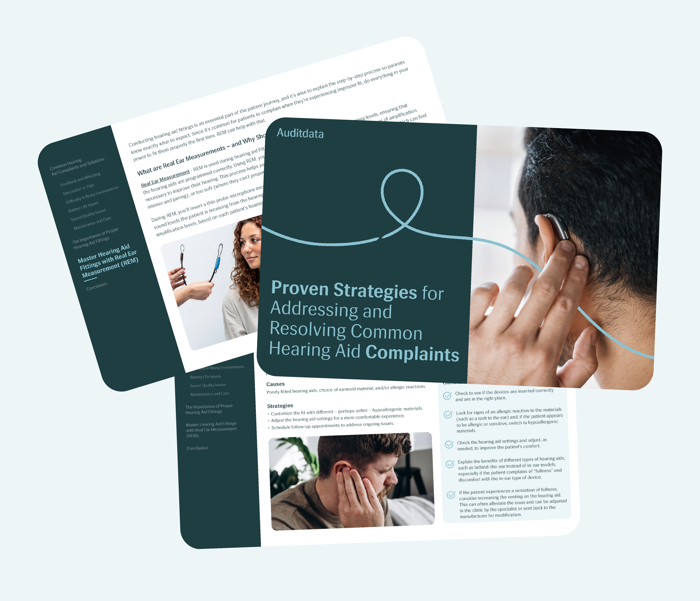
Less Chance Of a Heart Attack Or Stroke
Did you know that low-frequency hearing loss may be a marker for an increased chance of stroke and heart attack? A study found that people with poor scores on various heart risk factors had more severe hearing loss. On the other hand, better scores on those heart risk factors (e.g., healthy weight, physical activity, good blood pressure and fasting glucose) were linked to better hearing. Other researchers linked untreated hearing loss in men to a greater chance of death within five years, usually from heart disease.
And yet another study found that men with untreated hearing loss were 33% more likely to have a stroke or heart attack and die vs. men without hearing issues – but wearing a hearing aid lowered the risk of these cardiovascular events. Researchers aren’t certain why hearing aids were connected to lower risk of heart disease and stroke, though it may indicate that these men are taking better care of their health overall.
Better Relationships and Social Confidence
Hearing loss can make it difficult to maintain good relationships with a spouse or partner, friends, family, and colleagues. Relationship problems often stem from communication difficulties, which are common among people with hearing impairment. People with hearing loss also tend to have difficulties following conversations in social situations, especially in loud, crowded environments, which put a strain on their social lives. People with untreated hearing loss frequently avoid social situations due to frustration or embarrassment over being unable to hear properly. As a result, they may lose friends, stop getting invited to dinners, parties, and other events, and increasingly feel isolated and depressed.
A British study found that 44% of those surveyed said relationships with their partner, friends, or family suffered because they couldn't hear properly, 52% said they feel left out and ignored in social situations because they couldn’t participate in conversations, and 34% lost touch with friends or had their marriages fail due to their untreated hearing loss. Backing up this data, a Hear the World Foundation survey found that, for 70% of respondents, hearing aids improved their relationships.
Greater Safety and Awareness in Daily Life
For those with severe untreated hearing loss, living independently can pose safety concerns. For example, if an individual cannot hear doorbells or fire alarms in homes without assistive versions of these devices. Additionally, some people can become anxious in crowded situations if they can't hear properly. This can result in anxiety surrounding errands or other activities out of the house. When individuals with hearing loss obtain hearing aids, their self-confidence and independence often improve.
Better Work Performance
Hearing loss can be detrimental in the workplace. For instance, being unable to hear instructions properly often means that employees make more mistakes and are perceived as poor performers. Then, the poor performance can have a variety of negative outcomes, including getting fired or laid off, getting passed over for promotions, and even receiving a lower salary. For instance, jobs involving regularly speaking on the phone, speaking to customers, or performing in loud environments can be especially difficult for people with untreated hearing loss.
Unfortunately, people often receive decreased pay as a result of their hearing impairment – and can actually lose as much as $12,000 in income annually. In addition, people with severe hearing loss have unemployment rates that are double the rates of people without hearing loss, and nearly double the rate of people who wear hearing aids.
Improved Balance
Your patients might not realize the correlation between hearing loss and balance problems. Individuals with untreated hearing loss are three times more likely to fall than people with proper (or corrected) hearing, and that risk increases by 140% for every additional 10 decibels of hearing loss.
Experts say that balance requires brain power, but when people can’t hear properly, they must use considerable brain power to try and decipher sounds, making them more susceptible to falls. Individuals that use hearing aids and other devices to improve their hearing often see improvement in their balance, as well.
Improved Brain Function and Memory
Using hearing aids can help improve brain function and working memory. Researchers followed older adults with hearing loss who had never worn hearing aids. One group was given hearing aids to wear for six months, while the other group went without. The researchers used numerous tests to assess participants’ hearing, memory, attention, and processing speed.
After six months, the scientists repeated the same tests and found that the people who wore hearing aids showed improved memory and processing speed vs. those who went without. The researchers concluded that being able to hear properly “frees up” resources in the brain so people with better hearing can use more brain power on cognitive function.
Communicate These Benefits to Patients

Many people still feel stigma around needing (and wearing) hearing aids, which is a big reason why only about 20% of adults that need hearing aids actually use them. When people feel ashamed of their hearing loss, they may refuse to acknowledge it, argue that it’s not bad enough to warrant hearing aids, make excuses about why they don’t get a hearing screening, and/or postpone seeking treatment.
For a deeper look at why patients see glasses vs hearing aids so differently—and how that mindset fuels stigma—see our article on the “double standard” between the two.
It's common for people to worry that hearing aids will make them seem old, weak, frail, and even stupid. They might erroneously think hearing aids are still big, ugly, and embarrassing and resist getting them. Perhaps they’re worried about the cost and think they can’t afford hearing aids. They might think that using hearing aids will be difficult, time-consuming, or overwhelming to use, so they decide not to bother.
But what if audiology professionals spotlighted the many benefits of hearing aids that go beyond just improving people’s hearing? If people knew that hearing aids could potentially improve their heart health, balance, social life, and their salary, would they stop waiting so long (an average of 7-10 years!) to do something about their hearing loss?
Overcome the stigma associated with hearing aids by highlighting the benefits of using these devices. When audiologists explain that hearing aids do more than enhance someone’s hearing – they can improve so many aspects of their health and quality of life – it may make people more receptive to the idea of getting them.
Spotlight The Innovative Technology
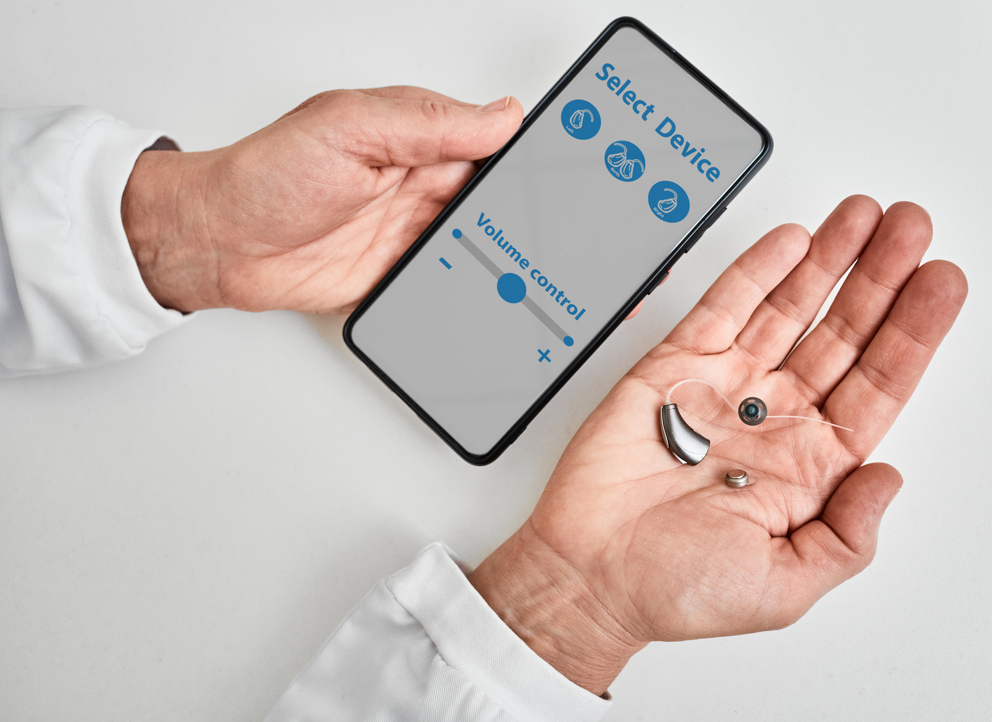
Today’s hearing aids are wildly different than the devices your grandparents used to wear. The technology has evolved tremendously, improving the sound quality as well as their features and functions.
Hearing aids can now be linked to an app so users can easily adjust the volume and settings from their smartphone. Linking hearing aids devices directly to a smartphone also lets users improve their hearing on phone calls and Zoom/Teams meetings.
New technology in hearing aids has improved audiology dramatically. Artificial intelligence (AI) can sense millions of sounds and automatically make hearing aid adjustments in real-time, so users don’t have to tinker with different pre-set modes to tune out background noise, wind, etc. AI can also prioritize voices to amplify the sound of the user’s spouse, kids, or best friend, even in environments with ambient noise, and can enhance voices when people are speaking with masks covering their faces.
Additionally, some AI-powered hearing aids can track the wearer’s heart rate, notify loved ones of health issues (such as a fall), and even predict early signs of dementia. With rechargeable batteries, users don’t have to worry about their devices running out of power or fiddle with replacing tiny batteries in their device. Bluetooth technology provides exceptional connectivity. And there are even hearing aids that can monitor your fitness like a FitBit or other wearable fitness tracker. Other tech features include better reduction of background noise, 360-degree microphones for better sound capture all around the user, and highly water-resistant options that may appeal to users with active lifestyles. Advanced hearing aid technology has improved hearing aids’ features and functions, so people can hear more clearly and feel more connected.
Showcase the New Look And Feel
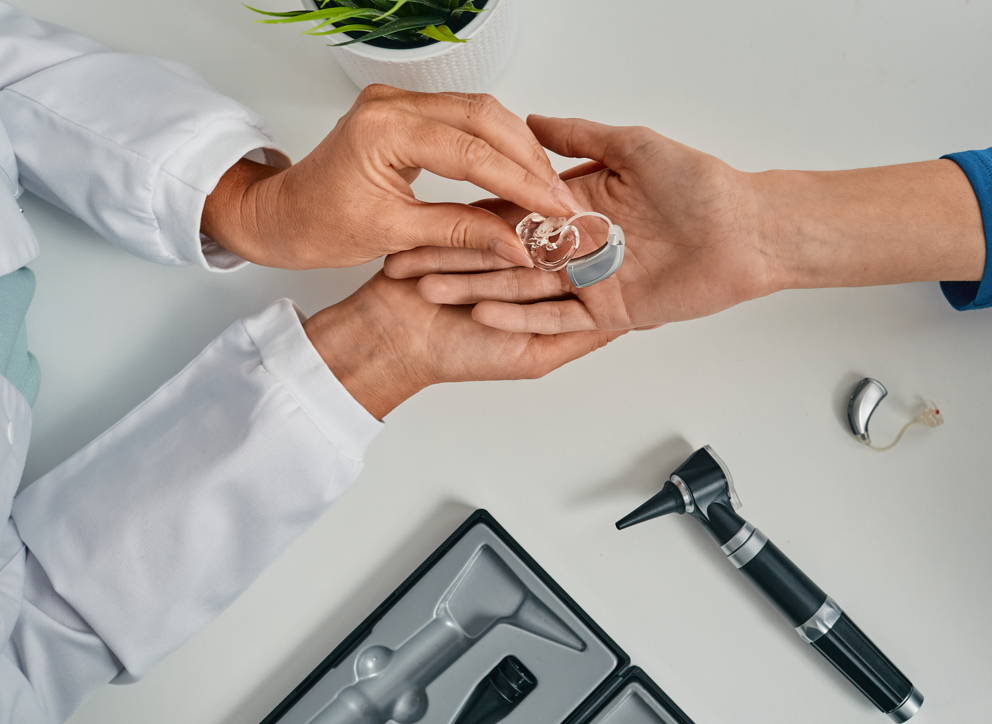
Today’s hearing aids are much better looking, as well as sleek, comfortable, and technologically advanced. Not only has sound quality improved dramatically, but so have styles. There are now a variety of styles (and hearing aid accessories) so people can select the ones they prefer to accentuate their looks. For example, the Hear-O brand makes exchangeable colored discs so users can easily swap out different colors to accessorize their outfits and match their mood. And Deafmetal makes hearing aid jewelry and accessories so people can jazz up (and personalize) their devices. Some brands offer chrome or metal, high-gloss hearing aids. Others are encrusted with Swarovski crystals. Gold ear cuffs meant to accentuate hearing aids were featured in fashion magazine Vogue. Emphasize how hearing aids are becoming more stylish and trendy, available in different colors, patterns, and designs, so customers can choose the options that complement their style.
Don't Miss Out On the Latest Insights On Audiology
Sign up today to receive exciting updates, tips, and the latest newsletters from Auditdata.
Other Blogs You Might Enjoy
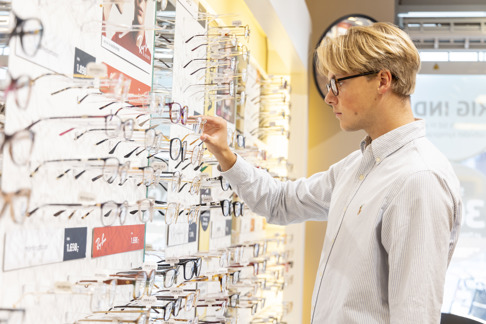
Exploring the Double Standard of Hearing Aids and Glasses
Why is there a stigma around wearing hearing aids, but not around wearing glasses? Eyeglasses were once a sign of age and impairment – remember the cruel old taunts of “four-eyes” – but are now seen as cool and trendy. Hearing aids should have a similar evolution: from stigmatizing burden to innovative, wearable tech.

Unveiling the Age Bias & Adding Diversity in Hearing Aid Advertisements
Hearing aid advertisements often feature older, Caucasian people passively sitting in chairs while wearing their hearing aids, which feeds into negative stereotypes about hearing loss. To change the perception of hearing loss – and show that it happens to people of all ages, races, backgrounds, etc. – advertising and marketing efforts must become more inclusive.
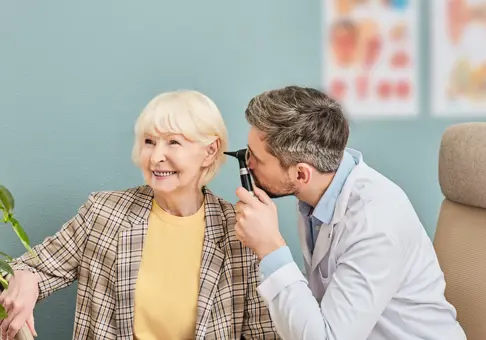
Why Hearing Aids Face Resistance and How We Can Shift the Narrative
No one wants to have a hearing loss, and most people are not excited about the prospect of needing hearing aids. How can you, as a hearing care provider, help them overcome the barriers and realize the benefits of getting hearing aids?